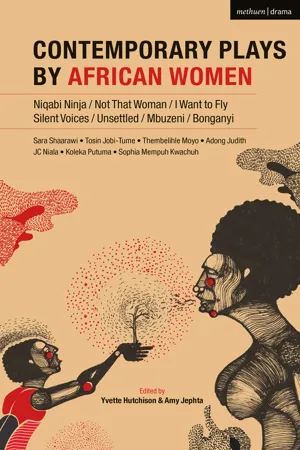
Contemporary Plays by African Women
Niqabi Ninja; Not That Woman; I Want to Fly; Silent Voices; Unsettled; Mbuzeni; Bonganyi
Sophia Kwachuh Mempuh, JC Niala, Adong Judith, Thembelihle Moyo, Koleka Putuma, Sara Shaarawi, Tosin Jobi-Tume, Yvette Hutchison, Amy Jephta, Yvette Hutchison, Amy Jephta
- 344 páginas
- English
- ePUB (apto para móviles)
- Disponible en iOS y Android
Contemporary Plays by African Women
Niqabi Ninja; Not That Woman; I Want to Fly; Silent Voices; Unsettled; Mbuzeni; Bonganyi
Sophia Kwachuh Mempuh, JC Niala, Adong Judith, Thembelihle Moyo, Koleka Putuma, Sara Shaarawi, Tosin Jobi-Tume, Yvette Hutchison, Amy Jephta, Yvette Hutchison, Amy Jephta
Información del libro
This volume uniquely draws together seven contemporary plays by a selection of the finest African women writers and practitioners from across the continent, offering a rich and diverse portrait of identity, politics, culture, gender issues and society in contemporary Africa. Niqabi Ninja by Sara Shaarawi (Egypt) is set in Cairo during the chaotic time of the Egyptian uprising. Not That Woman by Tosin Jobi-Tume (Nigeria) addresses issues of violence against women in Nigeria and its attendant conspiracy of silence. The play advocates zero-tolerance for violence against women and urges women to bury shame and speak out rather than suffer in silence. I Want To Fly by Thembelihle Moyo (Zimbabwe) tells the story of an African girl who wants to be a pilot. It looks at how patriarchal society shapes the thinking of men regarding lobola (bride price), how women endure abusive men and the role society at large plays in these issues. Silent Voices by Adong Judith (Uganda) is a one-act play based on interviews with people involved in the LRA and the effects of the civil war in Uganda. It critiques this, and by implication, other truth commissions. Unsettled by JC Niala (Kenya) deals with gender violence, land issues and relations of both black and white Kenyans living in, and returning to, the country. Mbuzeni by Koleka Putuma (South Africa) is a story of four female orphans, aged eight to twelve, their sisterhood and their fixation with death and burials. It explores the unseen force that governs and dictates the laws that the villagers live by. Bonganyi by Sophia Kwachuh Mempuh (Cameroon) depicts the effects of colonialism as told through the story of a slave girl: a singer and dancer, who wants to win a competition to free her family. Each play also includes a biography of the playwright, the writer's own artistic statement, a production history of the play and a critical contextualisation of the theatrical landscape from which each woman is writing.